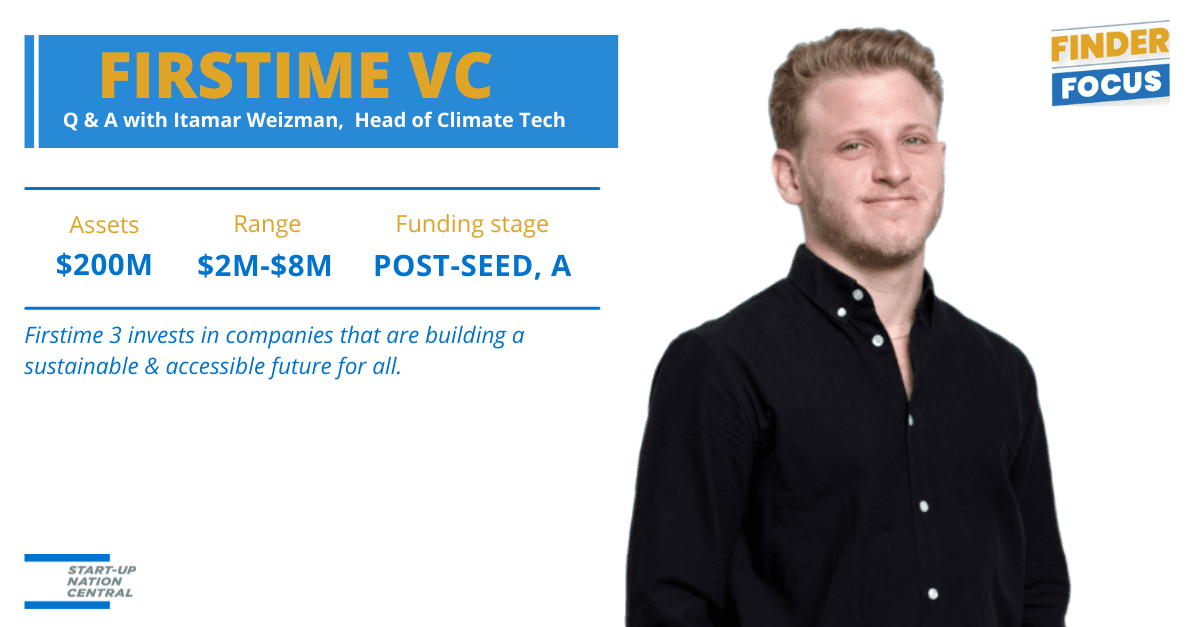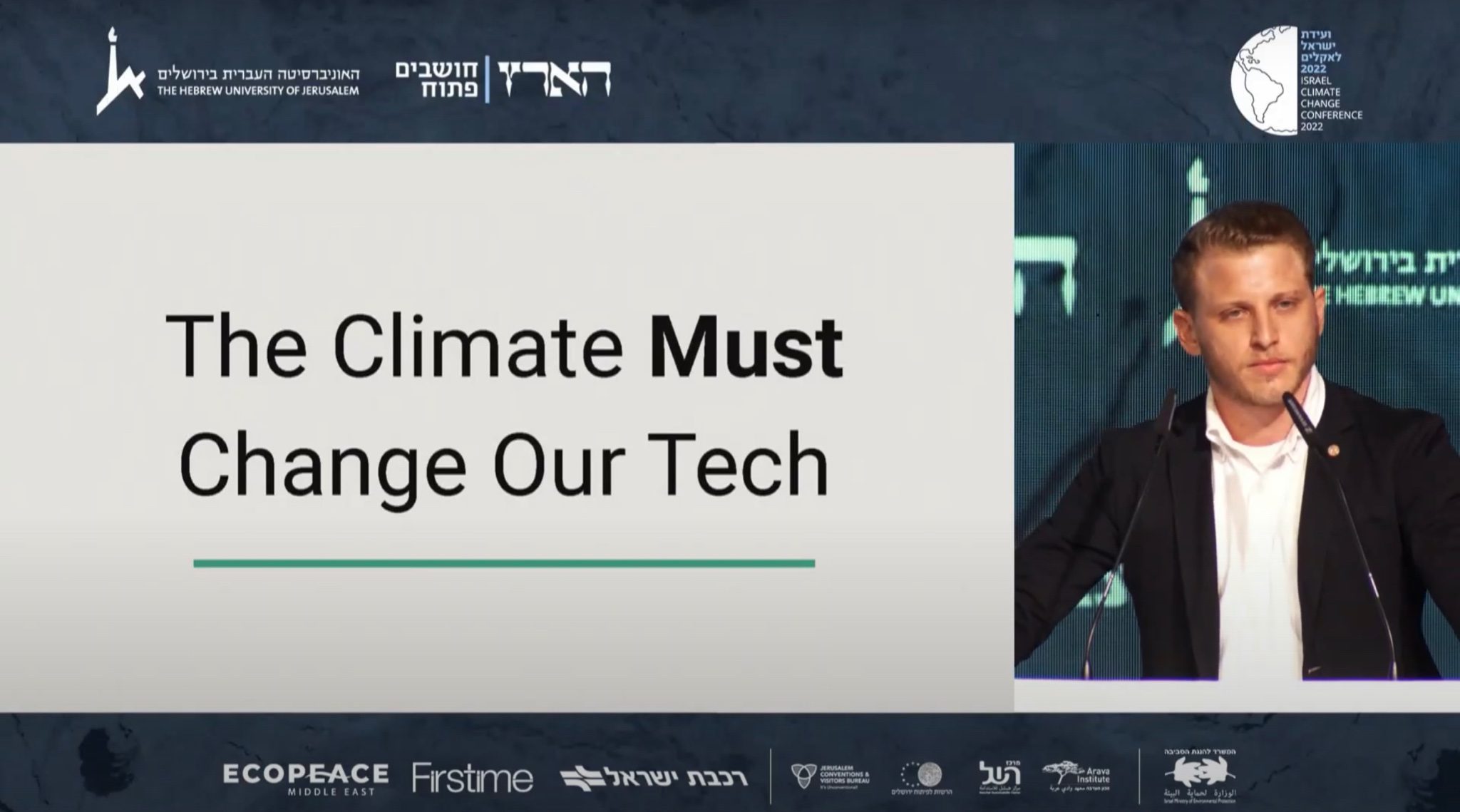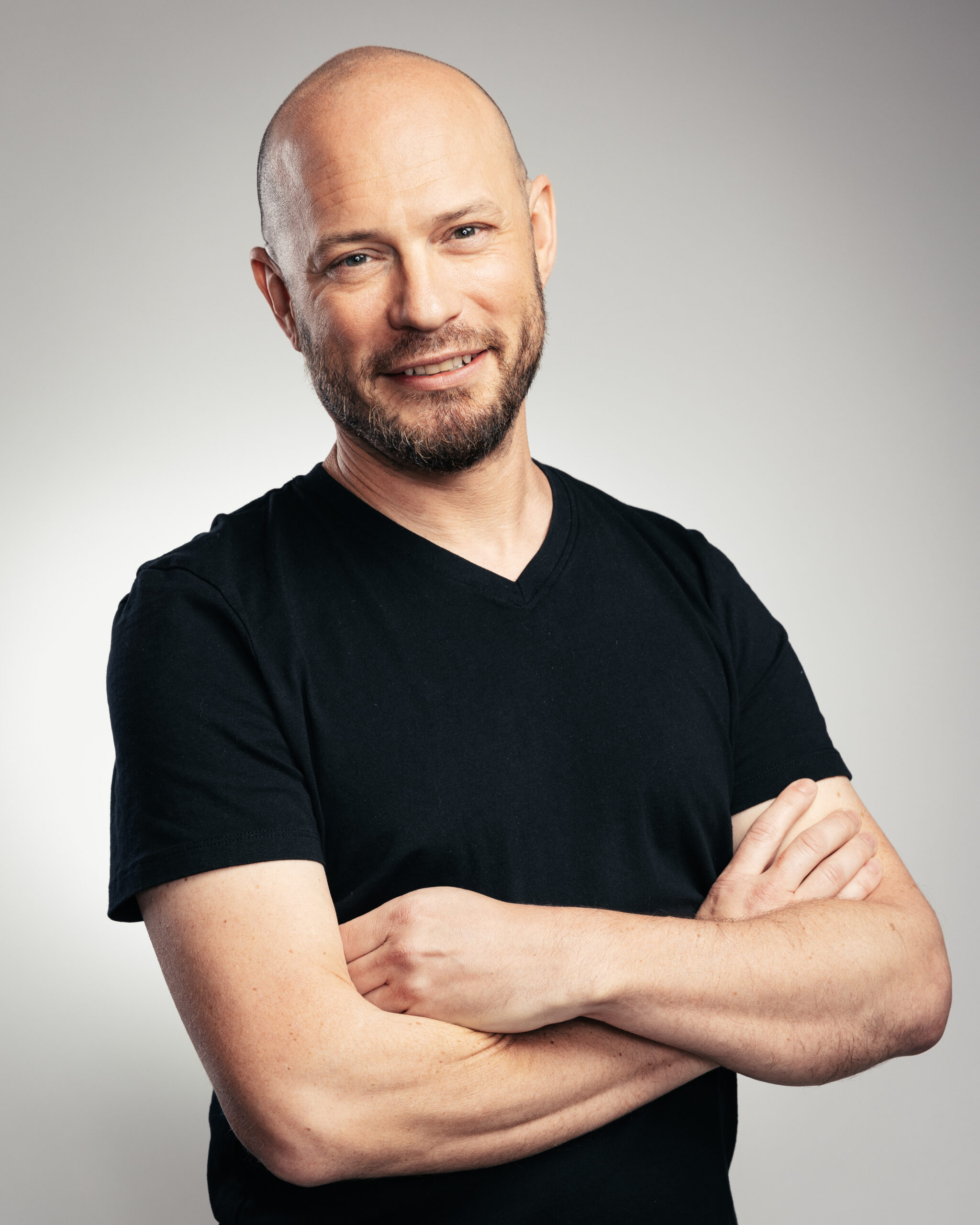Meet the Israeli VC going all-in on the climate revolution
Climate Tech
Firstime Venture Capital is a fund investing in companies that are building a sustainable and accessible future for all.

“We invest Israeli funds, in Israeli entrepreneurs”
Itamar Weizman is a partner & the Head of Climate Tech of Firstime Venture Capital, an Israeli venture capital firm investing in pioneering startups and founders that are helping to solve the world’s most urgent challenges: reaching net-zero carbon goals which will help mitigate the climate crisis, precision agriculture tools that will help us adapt our farming and food industry to our new climate, and accessible digital health solutions that can help billions of patients.
Start-Up Nation Central sat down with Itamar for an interview about Firstime Venture Capital and its role in the Israeli climate tech innovation ecosystem.
Start-Up Nation Central: Tell us a bit about the history of your investment firm, your VC, and its main aims today.
Itamar Weizman (IW): I’m a partner and head of investments in climate tech at Firstime Venture Capital, which started in 2010 as a government-backed incubator. In 2014, we launched our first VC firm with $60 million, followed in 2017 with another fund of $60 million. At the 2021 Global Climate Conference we announced our plans to invest in climate and sustainable tech – and I joined as a partner to launch our Sustainable Tech Fund, which invests according to the Sustainable Development Goals (SDGs) of the UN. Practically speaking, we invest two-thirds of the fund in climate tech (agriculture, energy, circular economy, carbon reduction, basically anything that could help mitigate or adapt to climate change), and one-third of the fund goes into digital health. Throughout the company’s history and growth, we have continued the practice we’ve always had of investing Israeli funds in Israeli entrepreneurs only – but now we invest in bigger check sizes ($2-8 million check sizes), and we invest in post-seed, A rounds, etc.
Start-Up Nation Central: How much are you planning to invest in how many companies?
IW: We’re planning to invest in at least fifteen companies total, with a cap on the fund of $125 million, which we’ll probably close on by the end of the year. We’ve already deployed $20+ million, and two of our companies are now going to second rounds, just six months after we’ve invested. These are the five companies we’ve invested in so far:
- Climate: Bee Hero looks to address pollination and colony disorders in order to help farmers adapt to the difficulties that climate change brings to crops.
- Climate: Growin is a vertical aeroponic farming company, bringing farming indoors to grow better produce with less water, little to no land, and almost no pesticides.
- Climate: First Airborne uses fully autonomous drones in the wind turbine industry to optimize the machinery while cutting the carbon footprint of costly resources previously used to maintain the turbine equipment.
- Health: Hygieia is an FDA-approved insulin management solution that helps people suffering from diabetes get precise prescriptions without going to the doctor each time.
- Health: Feel Better looks at drug-related problems and attempts to solve them and prevent people from hospitalization. This company is a Teva company graduate, now relocating to the US.
“I thought that change would happen through politics … actually, change is also going to happen through innovation and technology and entrepreneurship.”
Start-Up Nation Central: You seem to have climate as a throughline in your career – how did you go from politics to co-working to venture capital, and how does climate fit into that for you?
IW: I’m a classic millennial trying to figure things out. I grew up in a place where I always thought that things could be better, for people and humankind, and I thought that change would happen through politics. Then eventually I figured out that, actually, change is also going to happen through innovation and technology and entrepreneurship. After university, I managed a Greenpeace campaign called Unfriend Coal, which turned Facebook renewable, and then we turned Google renewable. We worked with Nike, Puma, Nestle, etc. – lots of huge companies to basically improve their SDGs dramatically.

Fast forward a few years, and I went to work with MindSpace as VP of Marketing and Digital, so I built their brand and the platform. Then I had an idea to help get out the vote, so I launched an organization called V15. I am very proud to say that all the tech giants of Israel invested in us, we raised $5 million, and we built a tech team to map voters to map data – we had two dozen developers, which no political organization has – so we kind of looked like a political startup.
But I got a bit burned out and didn’t want to continue with politics. I started another company in a different sector and again scaled it up really quickly. I learned a lot about entrepreneurship, building a product, and building a team, but again I got burned out really quickly. So I exited to focus on climate.

“I can’t work on something else when I know that climate change is the biggest threat to humanity – that’s a huge cognitive dissonance.”
Start-Up Nation Central: What inspired you personally to focus more on climate and get involved in climate tech?
IW: I read The Uninhabitable Earth by David Wallace Wells, and the visualization of the climate impact really hit me very hard. I realized that I needed to shift my entire career into climate. I can’t work on something else when I know that climate change is the biggest threat to humanity – that’s a huge cognitive dissonance. So I started studying a lot, reading everything I could, and trying to put myself in a very interesting position in the Israeli climate sphere.
The word sustainability is something we should really understand. Sustainability means we design a process that can continue on forever – to sustain it. We should want to live in a world that continues on. If we want to design a society that we could continue to live in, we should design a sustainable society – that means that we need to design a society that could continue further than three, four, or five generations. Right now, we’re not designing that. Technology and entrepreneurship have the capacity to either build sustainable or unsustainable businesses. We need to make the decision toward sustainability.
“The climate revolution is not just about investing in methods that help reduce the impacts of climate change. It’s also about how we sustain the life we want to live.”
Start-Up Nation Central: So what is the climate revolution? What does it mean to you?
IW: The climate revolution means we need to design society, businesses, and everything for a sustainable cycle. That means we need to design for sustainable growth, we need to design for sustainable teams, and we need to think about how we can sustain life. This is the only way we can protect what we’ve already built as a society: our economy, our jobs, our cities, everything. I remember that even as a very young person, I was already always mad at adults for causing so much damage to our world – we are now the adults, so we have the responsibility to decide what type of society we want to design. VCs are really important in this responsibility because they are the ones looking ten years into the future and saying, ‘I’m going to bet on that, I want to bet on a future that’s positive’. The climate revolution is not just about investing in methods that help reduce the impacts of climate change. It’s also about how we sustain the life we want to live. VCs need to focus on investments that help people.

“I want to create this huge mission where Israelis wake up every morning and say: I’m going to save the Earth, and I’m going to do that by designing better cities, better food, and a better world. ”
Start-Up Nation Central: What does success look like to you and how do you, what do you think you’ll feel like you’ve made it?
IW: I feel like I’ve made it when the story is not about me, but rather the vision we’re trying to build. The real victory here is not going to be about Itamar Weizman or Firstime, it’s going to be whether Israel takes thousands of its people (or tens of thousands, or hundreds of thousands) and puts them on a mission. I want to create this huge mission where Israelis wake up every morning and say ‘I’m going to save Earth, and I’m going to do that by designing better cities, better food, and a better world.’ Look at what’s happening in alternative proteins: Israel leading the way. Look at what’s happening in AgTech: Israel is leading the way. We could do that with waste management. We could do that with energy. We can do that with lots of things.
Start-Up Nation Central: It sounds like what success looks like to you is getting everyone focusing on the same objective, getting them aligned on climate, no matter who they are.
IW: Yes. And everyone has a different role to play. Some are teachers, some are farmers, some are engineers, some are designers, some are investors, and some are lawyers. I think that the biggest mistake of the environmental movement was to say to everyone that you have to go and protest. That’s nonsense. Everyone should find the thing they love doing, and then focus more of their time on climate.
When Start-Up Nation Central launches an SDG tag, that’s a huge impact because it helps other people figure out what exists out there. When you do a climate prize, it’s meaningful. And when you do a climate project, it’s meaningful. We need better role models and examples – people can only imagine what they can see. I really believe that we need to turn climate into a more visible thing and talk about it all the time – and not in a way that creates anxiety because that’s not helping. We need to talk about climate in a way that helps people imagine a great future.
“Anyone who bets on climate change will win big. Anyone who invests early in solutions is going to create big markets.”
Start-Up Nation Central: As a partner that is leading climate tech investors, what are the main challenges that you’re facing today?
IW: In the beginning, our fund was a generalist fund because we felt that this was the right thing – we could be opportunistic. The theme was simply great investors, great entrepreneurs, a large market, and a good business model, and we focused on the how not the what. Now because of the dire times we’re in, we have to focus on the why. We’re listening to industry leaders, who are saying ‘Wake up – if you don’t do this move to climate, you’re going to be left behind, and all the other great VCs in the world are going to take that space from you.’ So for us, it wasn’t just an ideological move, it was about understanding where the wind is going and shifting our direction that way.
VC has a huge challenge because it needs to bet on the ten-year future ahead. It needs to look ahead to the 2030s and say ‘this is what the world will look like.’ It’s a challenge, and a lot of VCs fail, for many reasons, but I believe one of them is because of a failed paradigm. One thing I really believe in is that anyone who bets on climate change will win big. Because that’s going to be a chronic crisis that’s going to follow us through, and anyone who invests early in solutions is going to create big markets. And I think that we’re still building big businesses in big markets with great entrepreneurs and that hasn’t changed from any other previous funds.
“Israel is probably the best talent pool in the world.”
Start-Up Nation Central: What do you think that investors and corporate executives around the world to know about Israel and why?
IW: I think they should know that Israel is probably the best talent pool in the world. And talent is basically what everyone needs – it is the rarest resource in the world, and that’s why everyone is coming to Israel – most investors already know that. Start-Up Nation Central was central in helping people understand that the Startup Nation is a leading force in entrepreneurship and visionary thinkers. That’s something that people should tap into for other challenges, not just financial growth. But I think that leaders already know that.
Start-Up Nation Central: And now for a fun question: can you recommend a fun activity or something for the international audience when they come to Israel.
IW: In the spirit of sustainability: there’s a nice, lovely park called Kiryat Sefer that was built because citizens of the neighborhood persisted against the municipality that it should be a park, not more towers. After five years of a local campaign, the residents won, and now there’s a huge ecological park there. It’s a beautiful place to sit, read a book, walk around, and meet people – there’s also a shared community garden there where they grow vegetables, and they also have screening times of films in the evening and lots of families come. It’s a great example of people saying ‘this is the kind of city we want to design – let’s build that’ and viewing that is very inspiring to me. It reminds me of the power of people, and what they can achieve as a community.

Phillip Stark is the Marketing Manager for Start-Up Nation Finder at Start-Up Nation Central. Finder is provided courtesy of Start-Up Nation Central, a non-profit organization that strengthens Israel’s innovation ecosystem and connects it to global challenges and stakeholders.
 Tech Ecosystem
Tech Ecosystem Human Capital
Human Capital Focus Sector
Focus Sector Business Opportunities
Business Opportunities Investment in Israel
Investment in Israel Innovation Diplomacy
Innovation Diplomacy Leadership Circle
Leadership Circle Our Story
Our Story Management Team
Management Team Careers
Careers